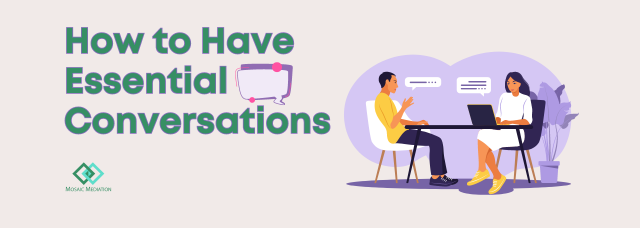How to Have Essential Conversations
Looking at ‘difficult conversations’ differently

Let us start with a reframe, shall we?
I fully acknowledge that some conversations are particularly awkward and that many people would prefer to avoid having them if possible. Even as a mediator, I do not enjoy the build-up to tackling a personal conversation which feels delicate and has the potential for conflict.
I am also very aware of the impact of a label. By labelling these types of conversations as ‘difficult’, I think that people automatically anticipate that it will be unpleasant and tough. So, already it becomes a thing that our brain would want to guard against.
For most people, when they are focused on the goal instead of the potential problem, they are more motivated to take action. So, I prefer to frame these as ‘essential conversations’ – the value and necessity of the conversation becoming the focal point, rather than any anticipated awkwardness or challenge.
And, actually, most essential conversations, approached effectively, tend to be far more positive and productive than the 'worst case scenario' thoughts would have you believe.
I look at essential conversations as a logically required element in any healthy relationship – “If I want to still like this person in a few years’ time and not be full of resentment, I owe it to us both to have the essential conversations.”
My coaching clients regularly have initiated the enquiry when they realise that they have been putting off essential conversations or they believe they could approach them more effectively. Some of my clients are in leadership positions, others have colleagues, clients or managers that they want to be more assertive with, and some come to me about a specific personal relationship or a general desire to communicate with more confidence.
WHY do they seek coaching support for this?
They have experienced the negative impact of NOT having constructive conversations – either at all, or just not in a way that worked.
When you tackle an essential conversation ineffectively, it can escalate issues, cause misunderstandings, and leave the person feeling like they have no route left to improve the situation.
When you delay in having an essential conversation, individuals are more likely to be quite entrenched in their beliefs – even if you have evidence to the contrary. It takes much more work to rebuild trust and be listened to.
When you do not have the conversation at all, the issues either remain or escalate, everyone involved is missing information which could change their opinion and the course of the relationship, other people notice there is a problem but no one is dealing with it, more assumptions are made, the avoidant individual may get defensive about their approach but feel even less able to do it as time goes on, and it does damage to reputations and relationships.
In the workplace, this is also likely to negatively affect the team dynamics, productivity and the perspective on someone’s leadership potential.
I have great compassion and respect for individuals who have struggled in the past but are willing to try new things with the aim of improving their situation. In general, it is the ‘peacekeepers’ in the team/family/friendship group that value their relationships so much that they want to find a better way.
This also applies to those individuals who have been accused of being too confrontational or aggressive in the past, and now they want to learn how to communicate in a way that is received positively.
What is great about the human brain though, is that we can do things to change the automatic response to dealing with awkward situations.
There are so many techniques that we coaches can use with clients that they can use to feel empowered, have clarity about what they want and why, communicate effectively, and think differently about situations they would previously have avoided at all costs.
I believe so strongly that learning how to have essential conversations is a vital skill, that I believe the learning should be as accessible as possible.
So, if you would like a resource that helps you prepare for an essential conversation with clarity, you can find that here: 5 Steps to Clarity in Essential Conversations
If you find it helpful to listen to guidance on essential conversations, you can watch a 5-minute video on this topic here: How to Have Essential Conversations - Video
And, of course, if you would like some one-to-one work that goes a little further, please get in touch. When someone has the skills to navigate essential conversations it flows into so many other areas – improved relationships at work and outside of work, increased assertiveness, a more confident and clearer mindset, and the ability to set and maintain healthy boundaries.
For more tips on how to communicate assertively and practical methods for having productive, honest, and peaceful conversations, go to Mosaic Mediation Resources to access a wide range of resources. For support in developing yours or your team’s communication skills, or for advice on handling workplace conflict, go to the Contact or Services page.










